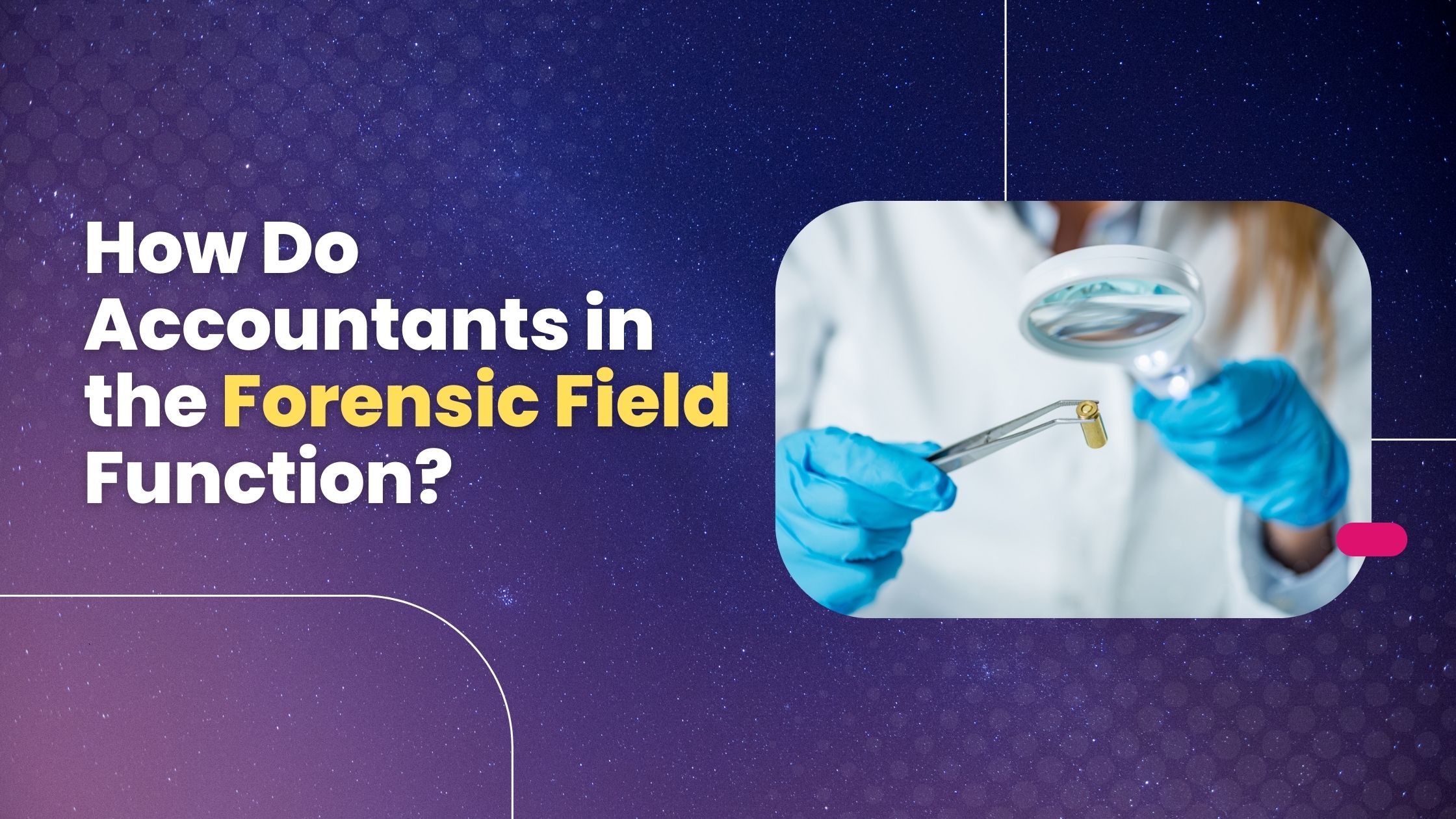How Do Accountants in the Forensic Field Function?

If you’re good at understanding puzzles and have an aptitude for them, you could decide to seek a career in forensic accounting. In order to look for deception, buried assets, and other financial offenses, forensic accountants look within the lines, combining the fields of research and economics. The importance of forensic accountants goes beyond current reliance due to the increasingly complex modern financial world, in which financial crimes can be tracked, complicated financial documents can be investigated, and expert advice can be given to the courts. Therefore, in case you wonder, “I wish somebody could pay someone to take my online class for me,” always think of the importance of forensic accountants and the set of special skills they possess. Take my online course for me has become a household name and everyone knows that it is an online assistance service that helps students in guiding them throughout their course of study.
How Are Forensic Accounting Cases Handled?
The primary distinction between forensic accounting and regular accounting is that the former use judicial techniques to determine the legality of a company’s transactions. In addition to acting as specialists in these types of investigations, forensic accountants are able to present their conclusions in court. In this process, the business’s records of finances are audited by accountants to determine whether or not fraud has been perpetrated by the business. These accounting professionals are able to request and review the company’s complete set of books.
The authorities or the firm’s board may require that the company review its accounting, therefore the corporation cannot refuse to comply. Due to the large volume of activities, they must review, these certified public accountants or businesses analyze the books using scientific methods.
The governmental entity or the firm board receives their findings, which are admitted into evidence when presenting expert testimony in court.
See also: Broad Overview to a Career as a Chartered Accountant
What are the various obligations and accountabilities of forensic accounting?
Forensic accountants carry out a variety of duties using their expertise of accounting, capacity for analysis, and comprehension of legal norms and methods:
- Examining financial data to find anomalies, inaccuracies or criminal conduct like theft, trade secrets, laundering of funds, and forged financial statements is known as “investigation of frauds and economic crimes.”
- Forensic accountants also provide legal teams with financial analysis and expert witness testimony to support arguments for justice. They also explain the economic proof in an easy-to-understand manner.
- Forensic accountants can assist in trying, tracing, and finding hidden assets through an analysis of complex financial data that reconstructs financial events. These are typically followed by reports with clear and elaborate findings, usually prepared for potential court use.
- They examine a business’s procedures and financial controls for any weakness and make recommendations on changes to prevent fraud or other abuses in the future.
- Valuation of companies and property—the forensic accountant does this in cases of separation or investors’ row to ensure fair compensation is paid out.
- Verifying the validity and accuracy of insurance claims in complex and disputed cases.
What are the types of forensic accounting?
When there is a possibility of fraud or other wrongdoing, forensic accounting refers to the application of technological techniques to investigate a company’s or individual’s financial records. In most of countries there are various forms of accounting for forensic purposes, and each kind looks into a certain facet of financial crimes within the company. The following are a few varieties of forensic accounting:
Examining and Investigating Fraud
In this kind of forensic accounting, a certified accountant or the company looks into the fiscal records of the business to determine whether there has been any kind of theft or theft. The most common uses for this kind of forensic accounting include laundering funds, asset theft, and financial offenses.
Legal Support Experts
These professionals in accounting specialize in lending their professional evaluation, accounts, and evidence to support court matters. In cases involving agreements, trademarks, shareholder disagreements, and other matters, they could be asked to compute monetary damages, evaluate financial losses, locate assets, or examine financial activities.
Criminal Investigations
Forensic accountants specialized in accounting are required to determine whether a crime has been committed or not and the probability that a crime was committed with criminal intent. Some of these crimes include identity theft, fraudulent insurance coverage, securities fraud, theft from employees, and financial statement fraud
Tax Inquiry and Adherence
In this category of accounting firm, a certified accountant helps an individual or business pay their taxes and if needed makes an inquiry. In the process of doing this, they help an individual or business examine their book-keeping records and if need be they also prepare a plan for them.
Prevention of Money Laundering
Through the development of anti-money laundering procedures and regulations, the accountant with forensic expertise assists the business in stopping any money laundering activities within the corporation in this sort of forensic accounting.
The business can identify any money laundering activities within the organization and identify those involved by working with a forensic accountant.
Regulatory Compliance Specialists
These forensic accountants make sure that businesses follow rules concerning accounting records and conduct, including those related to anti-bribery and AML. They may investigate non-compliance cases or assist in implementing security measures to prevent offenses.
Forensic Accountants in Family Law
These accountants specialize in family law issues, specifically in marriage dissolution cases. They trace hidden assets, value marital property, and determine income to aid in calculating alimony or child support.
How to work as a forensic accountant
The discipline of forensic accounting is expanding quickly, providing numerous possibilities for anyone possessing the expertise and education required in forensic accounting. To begin a profession in forensic accounting, there are a few tasks you must do.
Obtain an appropriate bachelor’s degree
A profession in accounting for forensic purposes can be pursued using a variety of degree programs. One of them is enrolling in take my online course for me service. Entry-level employment usually requires a bachelor’s degree in accounting, finance, forensic accounting, or a related discipline. Companies, however, might also favor applicants who hold an advanced master’s or doctoral degree.
Get experience in your field
According to the Bureau of Labor Statistics, employment for financial professionals will grow 6 percent from 2021 to 2031. Apply for entry level accounting jobs with your bachelor’s or master’s degree to seek experience that will help you qualify to become a certified accountant.
Remember to keep in mind that business will expect a professional expertise in the industry as a career path to forensic accounting definitely is not an entry-level profession. You can seek out numerous hiring opportunities online or on any corporate job websites, or you can search your local or national government websites
Become a Certified Public Accountant
You must hold a certified public accountant (CPA) credential in order to be employed as a forensic accountant. State-by-state variations exist in the requirements for certification for CPAs, although in overall, completing an exam proving technical proficiency, having a minimum of a bachelor’s degree, and fulfilling requirements for experience are required.
What Abilities Does a Forensic Accountant Need to Have?
A competent forensic accountant needs to be multi-skilled. Their primary competencies should be in accounting, auditing, analysis, and research. The forensic accountant won’t be able to do what they do more effectively if they lack these abilities. Forensic accountants need to address several issues in their work at once while searching for anomalies so that they have to have the highest level of analytical proficiency possible. They also need to be good communicators since they will have to take these complex financial statements and present them in a meaningful way to the the business’s board of directors.
They must also give the business documents on these finances in a format that is understandable to someone without any experience in accounting or commerce.
What kind of work environment does a forensic accountant have?
Forensic accountants have the opportunity to find employment for a wide variety of companies in different industries. Amongst their most common employers are these: –
Public Accounting Firms: A lot of big accounting companies have dedicated forensic accounting departments that provide customers with legal assistance and analytical services.
Law Firms: Forensic accounting experts are often called upon by attorneys in law firms to assist in defending disagreements that involve financial disputes or deception.
Corporations: Large companies, particularly those with complex accounting systems or those engaged in highly regulated businesses, might utilize forensic accountants to investigate internal issues, ensure compliance, or prevent deception.
Government Organizations: Forensic accounting professionals are employed by organizations like the Securities and Exchange Commission, the Federal Bureau of Investigation, the Internal Revenue Service, and other oversight committees
They support regulatory enforcement, legal adherence, and financial crime investigations.
Conclusion
The likelihood of these forms of financial fraud in organizations is rising along with the nation’s business growth. This is why businesses have to keep up and apply SOPs that must be followed by all those within the company. Tighter controls by the companies will greatly minimize the possibility of this type of fraud being committed within their organization.
Accountings of the organization on a legal basis should be done with the help of outside companies to wipe out any kind of suspicions from a corporation. This makes sure that all the abnormalities are eliminated from the company.




